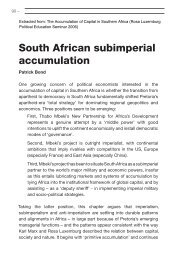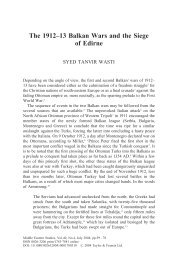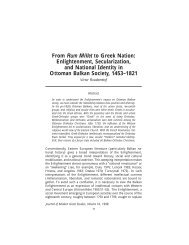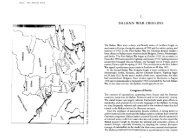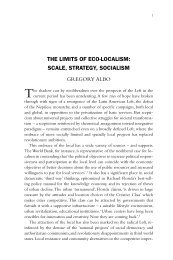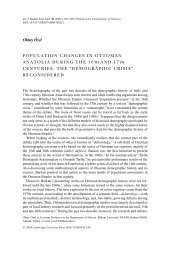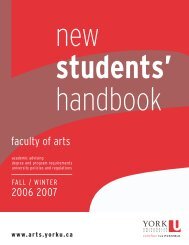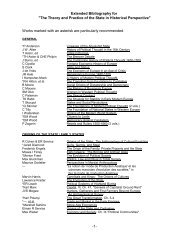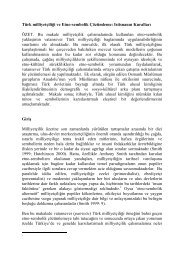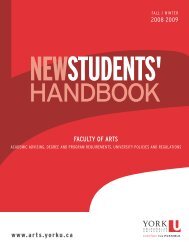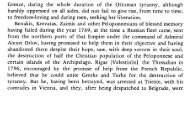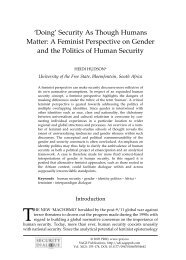FYCSG 05/06 REV2 - Faculty of Arts - York University
FYCSG 05/06 REV2 - Faculty of Arts - York University
FYCSG 05/06 REV2 - Faculty of Arts - York University
You also want an ePaper? Increase the reach of your titles
YUMPU automatically turns print PDFs into web optimized ePapers that Google loves.
SC/NATS1860 6.0 Science: Past, Present and Future. Modern science has drastically<br />
changed our lives and how we perceive the world and will do so in future. This course<br />
explores, through case studies <strong>of</strong> revolutions in biological and physical sciences, how<br />
scientists work, experiment, theorize, communicate and debate. Three lectures and one<br />
hour on-line tutorial per week. Two terms. Six credits.<br />
SC/NATS1880 6.0 Life Beyond Earth. This course considers the various factors required<br />
for life to exist beyond Earth, both life that may have evolved elsewhere and what<br />
would be necessary for humans moving out into space. Three lecutre hours per week<br />
plus alternate week tutorial/laboratory sessions <strong>of</strong> two hours. Two terms. Six credits.<br />
Degree credit exclusion: AK/NATS1730 6.0<br />
SC/NATS2700 9.0 Science: Fundamental Ideas and Social Dimensions. A study <strong>of</strong> key<br />
ideas in the physical, life, earth, space and environmental sciences necessary to teach<br />
the Ontario elementary science curriculum. The social dimensions <strong>of</strong> science and technology,<br />
especially relating to Canada, are integrated with the scientific material. Four<br />
lecture hours per week, twelve three-hour laboratories. Two terms. Nine credits.<br />
Prerequisite: Normally open only to those students co-registered in the <strong>Faculty</strong> <strong>of</strong><br />
Education Primary/Junior or Junior/Intermediate programs, or to those planning to<br />
apply for these programs.<br />
Note: Successful completion <strong>of</strong> this course will fulfil the <strong>Faculty</strong> <strong>of</strong> <strong>Arts</strong> Natural Science<br />
General Education Requirement.<br />
Philosophy<br />
When someone chooses to study philosophy they usually do so because they have a<br />
strong interest in ideas, and they like to think and discuss ideas they think are interesting.<br />
The philosophers who are teaching at <strong>York</strong> <strong>University</strong> are interested in important questions<br />
that have been thought about for thousands <strong>of</strong> years. Questions like: What is<br />
truth? What does it mean to do a good act? Is there something that all good arguments<br />
have in common? What does it mean to be a person? How is it that people acquire<br />
knowledge? Is that the same as being wise? Does God exist? Along with other contemporary<br />
philosophers we also study questions that have arisen more or less recently: Is<br />
cloning right or wrong? When is civil disobedience justified? Is democracy better than any<br />
other system <strong>of</strong> government? Why do we punish criminals by putting them in prison? Can<br />
computers think?<br />
Philosophers study these questions not only for their own sake, but also to sharpen<br />
their ability to think clearly, and to understand and interpret other points <strong>of</strong> view. The<br />
goal <strong>of</strong> studying philosophy is to better understand important ideas, and to become a<br />
better thinker, debater, writer, and a better person.<br />
All 1000 and 2000-level courses in philosophy are open to first year students. The 1000-<br />
level courses provide an overview <strong>of</strong> several different areas <strong>of</strong> philosophy and are ideal<br />
for students who are wondering what the study <strong>of</strong> philosophy is all about. The 2000-level<br />
courses are also introductory, but focus on a specific philosophical question or problem.<br />
Note: Honours majors are strongly urged to take PHIL2010 3.0, PHIL2015 3.0, PHIL2020 3.0,<br />
PHIL2025 3.0, and PHIL2100 3.0. All majors should consult the Undergraduate Program<br />
Director concerning course selection and design <strong>of</strong> individual programs.<br />
AS/PHIL1000 6.0 Introduction to Philosophy. An introduction to the basic issues and<br />
classic writers in the Western philosophical tradition. Areas such as ethics, metaphysics,<br />
theory <strong>of</strong> knowledge, and logic will be surveyed by examining the writings <strong>of</strong><br />
philosophers such as Plato, Aristotle, Descartes, Berkeley, Hume as well as more<br />
modern writers. (Cross-listed to AK/PHIL1000 6.0.)<br />
Degree credit exclusion: AK/PHIL2400 6.0.<br />
AS/PHIL1100 3.0 The Meaning <strong>of</strong> Life. This course explores a number <strong>of</strong> fundamental<br />
practical philosophical questions: What is the meaning <strong>of</strong> (my) life? What is happiness,<br />
and how can I achieve it? What is wisdom? What is death, and what does it<br />
mean to me? Readings from Plato, the Stoics, the Epicureans, Spinoza, Tolstoy, and<br />
contemporary philosophers.<br />
AS/PHIL2010 3.0 Origins <strong>of</strong> Western Philosophy. The Ancient Greek philosophers are<br />
the origin <strong>of</strong> modern Western thought. How did they construe reality, knowledge,<br />
and humankind’s relation to the world? Philosophers such as Heraclitus, Parmenides,<br />
Zeno and Democritus will be explored. (Cross-listed to AK/PHIL2010 3.0.)<br />
AS/PHIL2015 3.0 Plato and Aristotle. Plato and Aristotle are the pillars <strong>of</strong> Western<br />
Philosophy. Practically all modern thought has its roots in their work. This course<br />
examines their writings and philosophy.<br />
AS/PHIL2020 3.0 Reason, God and the Mind. The works <strong>of</strong> Descartes, Spinoza, and<br />
Leibniz are crucial building blocks <strong>of</strong> our contemporary understanding <strong>of</strong> the world. This<br />
course examines their work.<br />
AS/PHIL2025 3.0 Experience, World and the Self. The works <strong>of</strong> Locke, Berkeley and<br />
Hume manifested an approach to philosophy that emphasized sense experience and<br />
the development <strong>of</strong> all knowledge from it. This course explores this tradition and its<br />
impact on our current world view. (Cross-listed to AK/PHIL2025 3.0.)<br />
AS/PHIL2035 3.0 Asian Philosophical Traditions. This course is an introduction to the<br />
major philosophical traditions <strong>of</strong> India and China.<br />
AS/PHIL2<strong>05</strong>0 6.0 Philosophy <strong>of</strong> Law. A) Crime and Punishment: What is the criminal<br />
law for? What should be prohibited and why? What excuses allowed? B) The concept<br />
<strong>of</strong> law: What is a law? What is a legal system? Positivism, realism, and Natural Law<br />
theories. (Cross-listed to AK/PHIL2<strong>05</strong>0 6.0.)<br />
Degree credit exclusion: AK/PHIL3530 6.0.<br />
AS/PHIL2<strong>06</strong>0 3.0 Social and Political Philosophy. This course examines several theories<br />
<strong>of</strong> social justice including utilitarianism, social contract, theory, and natural rights.<br />
How do we distinguish between right and wrong? Good and evil?<br />
AS/PHIL2070 3.0 Introductory Ethics. This course provides a basic introduction to the<br />
major ethical theories in western thought, and to some basic metaethical questions.<br />
One such question is “What, if anything, does it mean to say that a certain action is<br />
morally good or right?” (Cross-listed to AK/PHIL2070 3.0.)<br />
AS/PHIL2075 3.0 Introduction to Applied Ethics. This course introduces students to the<br />
application <strong>of</strong> ethical theory to controversial public issues such as abortion, affirmative<br />
action, and euthanasia, among others.<br />
AS/PHIL2080 3.0 Perception, Knowledge and Causality. This course provides an<br />
introduction to philosophical discussion about what exists, or what is most real, the<br />
subject <strong>of</strong> metaphysics, and what we can truly know about such things. What are the<br />
most basic things, and how do they interact with each other? (Cross-listed to<br />
AK/PHIL2080 3.0.)<br />
AS/PHIL2090 3.0 Introduction to the Philosophy <strong>of</strong> Religion. Can we prove God’s<br />
existence or must we experience God directly? Is faith opposed to reason? Are miracles<br />
and revelations really possible? Do a mystic’s claims count as knowledge. (Cross-listed<br />
to AK/PHIL2090 3.0.)<br />
AS/PHIL2100 3.0 Introduction to Logic. Logic, in the philosophical tradition, is the<br />
study <strong>of</strong> what makes arguments valid. That is, it aims to distinguish correct reasoning<br />
from faulty reasoning. Modern symbolic logic begins this project by giving two complementary<br />
analyses <strong>of</strong> validity. This course presents the basic elements <strong>of</strong> modern<br />
symbolic logic for the beginning student.<br />
AS/PHIL2110 3.0 Truth, Theory and Superstition. There are diverse views on how<br />
to improve one’s understanding or to do research, even in the case <strong>of</strong> science. This<br />
course investigates the possibility <strong>of</strong> a method <strong>of</strong> science and also recent contributions<br />
to its theory. (Cross-listed to: AK/PHIL2110 3.0.)<br />
AS/PHIL2120 3.0 Existentialism. This course is an introduction to some <strong>of</strong> the central<br />
themes <strong>of</strong> existentialism, for example, the individual, being, the absurd, freedom,<br />
moral choice. These themes are explored in the work <strong>of</strong> philosophers such as<br />
Kierkegaard, Nietzsche, Camus, Sartre, deBeauvoir.<br />
AS/PHIL2130 3.0 Philosophy <strong>of</strong> Art and Literature. Is truth relevant to art? What<br />
connections are there between art and morality? Are aesthetic judgments purely<br />
subjective or is there an objective basis for them? What is the artist’s role in society?<br />
(Cross-listed to AK/PHIL2130 3.0.)<br />
AS/PHIL2160 3.0 Mind, Brain and Self. An introduction to metaphysical issues about<br />
the mind. What is the nature <strong>of</strong> the mind and what is its relation to the body? What is<br />
the self and what is it that makes one the same person over time? What is the nature<br />
<strong>of</strong> consciousness and what is its relation to the brain? (Cross-listed to AK/PHIL2160 3.0.)<br />
AS/PHIL2170 3.0 Freedom, Determinism and Responsibility. An investigation <strong>of</strong><br />
different concepts <strong>of</strong> freedom, arguments for free will and determinism, people’s<br />
responsibility for their actions and how it is adjudicated, the justification <strong>of</strong> punishment,<br />
and some related moral problems.<br />
24




